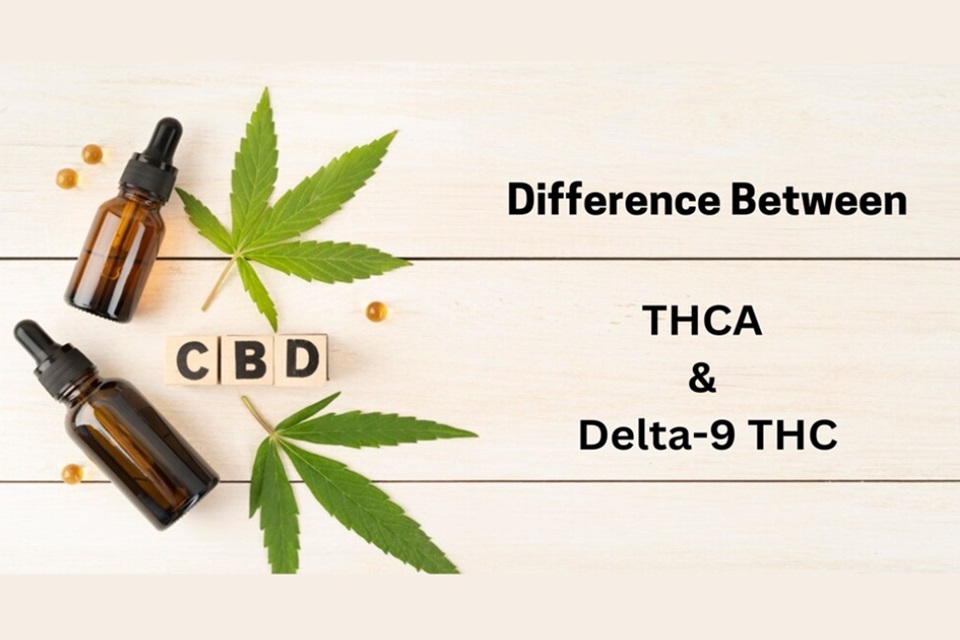THCA Vs Delta 9 THC: Exploring Their Differences & Effects
THCA (tetrahydrocannabinolic acid) and Delta-9 THC (tetrahydrocannabinol) are two compounds found in cannabis that play distinct roles in its effects and applications, including cannabis therapy. Understanding the differences between THCA and Delta-9 THC is crucial for anyone interested in the therapeutic and recreational aspects of cannabis.
THCA (Tetrahydrocannabinolic Acid)
THCA is the non-psychoactive precursor to delta-9 THC, predominantly found in raw cannabis plants and their products. It exists in significant quantities before the cannabis plant undergoes decarboxylation, a process triggered by heat, light, or aging. This conversion process occurs when cannabis is smoked, vaporized, or cooked, transforming THCA into delta-9 THC.
- Properties and Effects: THCA does not induce intoxicating effects on its own. Instead, it is associated with potential therapeutic properties such as anti-inflammatory, neuroprotective, and antiemetic effects. Research suggests THCA may also have potential applications in pain management and the treatment of neurological disorders like Parkinson’s disease and multiple sclerosis.
- Consumption Methods: Raw cannabis, cannabis juice, and certain edibles that have not been heated significantly retain THCA. These forms are favored by users seeking the potential health benefits without the psychoactive effects of delta-9 THC.
- Legal Considerations: THCA is generally legal in regions where cannabis consumption is legalized, as it lacks psychoactive properties until decarboxylation occurs.
Delta-9 THC (Tetrahydrocannabinol)
Delta-9 THC is the primary psychoactive compound in cannabis responsible for its euphoric “high.” It interacts with the body’s endocannabinoid system, binding primarily to cannabinoid receptors CB1 and CB2.
- Properties and Effects: Delta-9 THC produces a range of psychoactive effects, including euphoria, relaxation, altered sensory perception, and increased appetite (commonly known as “the munchies”). These effects vary depending on the dose, method of consumption, and individual tolerance.
- Medical Uses: Medically, delta-9 THC is utilized for managing pain, nausea and vomiting (particularly in chemotherapy patients), muscle spasms, and appetite stimulation in conditions like HIV/AIDS and cancer. It also shows promise in managing symptoms of certain mental health disorders.
- Legal Status: Delta-9 THC’s legal status varies globally. It is legalized for medical and/or recreational use in some jurisdictions, tightly regulated in others, and entirely prohibited in many countries due to its psychoactive properties.
Difference Between THCA And Delta 9
| Feature | THCA (Tetrahydrocannabinolic Acid) | Delta-9 THC (Tetrahydrocannabinol) |
| Psychoactivity | Non-psychoactive until decarboxylation | Psychoactive; induces euphoria and high |
| Primary Form | Found in raw cannabis | Produced after decarboxylation of THCA |
| Therapeutic Potential | Potential anti-inflammatory and neuroprotective effects; studied for pain management and more | Pain relief, nausea reduction, appetite stimulation |
| Consumption | Consumed in raw cannabis or juiced form | Smoked, vaporized, ingested in edibles |
| Legal Status | Generally legal in regions where cannabis is legalized for its non-psychoactive properties | Legalization varies; used medically and recreationally in some areas, prohibited in others |
Conclusion
THCA and delta-9 THC represent different facets of cannabis chemistry – THCA is a precursor with potential therapeutic benefits in its raw state, and delta-9 THC is the primary psychoactive compound sought after for both recreational and medical purposes. Understanding these differences is essential for users, healthcare professionals, and policymakers to navigate the complexities of cannabis use and regulation.
FAQs
What is the difference between THCA and Delta 9 THC in terms of psychoactivity?
THCA (Tetrahydrocannabinolic Acid) is non-psychoactive until it undergoes decarboxylation, which converts it into Delta-9 THC (Tetrahydrocannabinol). Delta-9 THC, on the other hand, is psychoactive and induces euphoria and a “high” when consumed.
Can THCA be consumed for its potential health benefits without experiencing psychoactive effects?
Yes, THCA is found in raw cannabis and certain products like cannabis juice or minimally processed edibles. These forms retain THCA’s potential therapeutic properties while avoiding the psychoactive effects associated with Delta-9 THC.
Where is Delta-9 THC legal, and how is it used medically?
Delta-9 THC’s legal status varies globally. It is legalized for medical and/or recreational use in some jurisdictions, particularly for managing pain, nausea, muscle spasms, and appetite stimulation in conditions such as cancer and HIV/AIDS. However, it remains tightly regulated or prohibited in many countries due to its psychoactive nature.





